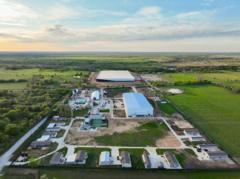A potential health disaster looms in Johnson County, Texas, as authorities uncover dangerous levels of toxic chemicals in agricultural lands linked to sewage-derived fertilizer.
Texas County Faces Emergency Over Contaminated Fertilizer Crisis

Texas County Faces Emergency Over Contaminated Fertilizer Crisis
Johnson County officials report alarming levels of PFAS in agriculture, prompting calls for federal intervention.
In a significant development concerning public health and agriculture in Texas, Johnson County has declared a state of emergency following alarming discoveries of harmful “forever chemicals” in local farmland. The announcement comes as investigators revealed substantial levels of PFAS (per- and polyfluoroalkyl substances) at two cattle ranches in the region, raising concerns over fertilizer derived from treated sewage used on surrounding farms.
Discovered by county authorities, these hazardous chemicals are known for their persistence in the environment and potential health risks, which include increased cancer risks and developmental issues in children. The investigation highlighted how contaminated fertilizer, originating from Fort Worth’s wastewater treatment facility, has adversely affected local agriculture, putting the community’s health at risk.
In light of these issues, Johnson County's commissioners have unanimously adopted a resolution calling on Texas governor Greg Abbott to support the emergency declaration and seek federal disaster assistance. Commissioner Larry Woolley addressed the gravity of the situation, emphasizing the uncharted territory this incident represents, as community members face potential disruptions to their livelihoods and health.
The allocated federal funds, as outlined by the county officials, would cover essential activities such as further testing and monitoring of drinking water sources, cleanup operations to remediate affected areas, and, regrettably, the euthanization of contaminated livestock.
The repercussions of this contamination extend far beyond immediate agricultural concerns, placing Johnson County at the forefront of ongoing national conversations about the safety of fertilizers and the broader implications of using sewage-derived solutions in farming practices. As the situation develops, the community remains watchful, hoping for timely federal support and effective remediation efforts.
Discovered by county authorities, these hazardous chemicals are known for their persistence in the environment and potential health risks, which include increased cancer risks and developmental issues in children. The investigation highlighted how contaminated fertilizer, originating from Fort Worth’s wastewater treatment facility, has adversely affected local agriculture, putting the community’s health at risk.
In light of these issues, Johnson County's commissioners have unanimously adopted a resolution calling on Texas governor Greg Abbott to support the emergency declaration and seek federal disaster assistance. Commissioner Larry Woolley addressed the gravity of the situation, emphasizing the uncharted territory this incident represents, as community members face potential disruptions to their livelihoods and health.
The allocated federal funds, as outlined by the county officials, would cover essential activities such as further testing and monitoring of drinking water sources, cleanup operations to remediate affected areas, and, regrettably, the euthanization of contaminated livestock.
The repercussions of this contamination extend far beyond immediate agricultural concerns, placing Johnson County at the forefront of ongoing national conversations about the safety of fertilizers and the broader implications of using sewage-derived solutions in farming practices. As the situation develops, the community remains watchful, hoping for timely federal support and effective remediation efforts.




















